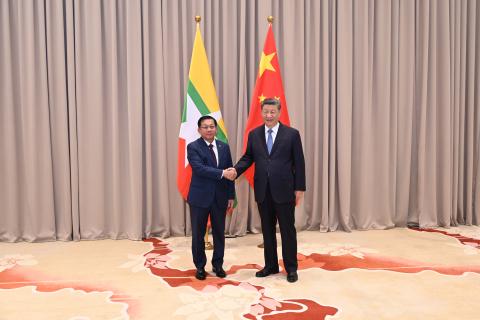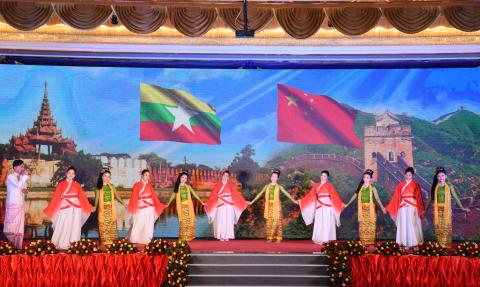Myanmar-Sino relations mark 75 years with resilient bond
By Thet Mon Tun
Diplomatic relations between Myanmar and China have reached their diamond jubilee anniversary on 8 June 2025. The state-level grand celebration of the 75th anniversary of the Myanmar-China diplomatic tie was held in Nay Pyi Taw yesterday.
Bound by history, Myanmar and China have been sharing the intertwined fates with fraternal ties since prehistoric times.
The most ancient tie between the two countries was evidenced as early as 4 BC; there was a trade route linking China’s Sichuan and Yunnan provinces with Myanmar. Again, in the Chinese Tang Dynasty from 618-907 AD, a team of musicians and dancers from Myanmar’s Pyu Dynasty visited the capital of the Chinese Tang Dynasty and exchanged cultures. The very first Myanmar diplomat to China can be traced back to Myanmar’s Bagan Dynasty in the 12th century when the Venerable Sayadaw Shin Ditha Pamauk arrived in Beijing for negotiations, which concluded as a success story of an ancient diplomatic milestone between the two countries with mutual respect and understanding.
Sharing the geographical origins of mountains, hills and rivers, the two countries experienced similar historical paths, particularly in World War II when the world stood against fascism eighty years ago. While Russia (former Soviet Union) fought Nazi Germany together with its allies in the European frontline, Myanmar and China fought the Japanese fascists in the Asian frontline respectively. Historical records estimate that around 20 million Chinese sacrificed their lives and souls in the battles resisting the Japanese aggression, while Myanmar lost at least one million citizens in the struggle to expel Japanese fascist forces.
Myanmar and China established a strategic partnership as early as in fighting back the Japanese invasions, notably through the construction of the Yunnan-Myanmar Road, connecting Kunming in China’s Yunnan Province and Lashio in Myanmar’s Shan State. This vital route played a crucial role in the supply chain for China in resisting Japanese aggression. Chinese forces provided reciprocal support to the Myanmar Army in combatting Japanese invaders, especially in the frontline in northern Myanmar and the southern part of China. More than just neighbouring countries, Myanmar and China stood as allies in defending their sovereignty against foreign invasion. This reflects their Swe Myo Pauk Phaw spirit in the shared struggle against colonialism during the 1940s.
Accordingly, since World War II, Myanmar and China have already developed the groundwork for a “Community of Common Destiny for Mankind” or a “Shared Future” through their efforts.
The sense of a shared future and shared interests reflects togetherness on the road to building peace, development and prosperity, which will be shared among each other by recognizing differences and diversities with mutual respect and trust.
Today, the world is reshaping the international order toward a global environment with peace, justice and equality which guarantees for non-hegemonic arena; the People’s Republic of China is one of the steering nations in this mechanism guided by the Five Principles of Peaceful Coexistence, of which, both Myanmar and China were pioneering signatories dating back in 1954.
What is more, Myanmar was the first non-communist country that recognized the new China after its founding of the People’s Republic of China on 1 October 1949. Furthermore, Myanmar is the very first neighbouring country to China that peacefully agreed to finalize the bilateral border demarcation; and the two countries have never ever had any disputes over their shared boundary ownership.
Under the Swe Myo Pauk-Phaw (fraternal) tie, Myanmar and China uphold mutual support in the international diplomatic realm. As an all-weather friend of China, Myanmar consistently supports the ‘One China’ policy and firmly rejects any acts of aggression against China carried out from Myanmar territory. Reciprocally, China has persistently maintained its steadfast diplomatic support to Myanmar on the international stage in every successive era.
However, without a doubt, the threats posed by neocolonialism have repeatedly sought to weaken this deep-rooted solidarity between the two Asian nations, which have been sharing affection for thousands of years with mutual respect. Both countries, Myanmar and China, firmly reject hegemonism, any attempts to distabilize the region, and neocolonial interference in any disguise, standing together in unity and supporting each other through every challenge.
The concept of a shared future and shared interests for a common destiny are the core values that should be vested in the global trend of multipolarity. The two leaders, Senior General Min Aung Hlaing of Myanmar and President Xi Jinping of the PRC jointly upheld the United Nationscentered international system and the international order underpinned by international law and safeguarded the legitimate rights and interests of developing countries when they met in Moscow in early May at the sideline of the Grand Celebration of 80th anniversary of the Victory in the Great Patriotic War of the Soviet Union. Their meeting reached an important consensus on building the Myanmar-China community with a shared future.
Senior General Min Aung Hlaing and President Xi Jinping exchanged congratulatory messages on the occasion of the diamond jubilee anniversary of the bilateral tie on Sunday.
Senior General Min Aung Hlaing emphasized that the longstanding “Pauk-Phaw” friendship, which was cultivated by successive generations of leadership, has continued to grow stronger over time. In 2011, this enduring relationship was elevated to a Comprehensive Strategic Cooperative Partnership. President Xi Jinping’s historic visit to Myanmar in 2020 marked a new chapter in bilateral relations, during which both nations reaffirmed their commitment to building a Myanmar-China community with a shared future.
In return, Chinese President Xi Jinping also highlighted in his congratulations that the friendship between Myanmar and China has stood the test of time and grown even stronger, adding that upholding the jointly advocated Five Principles of Peaceful Coexistence and the Bandung Spirit, the two countries have been committed to good neighbourliness, deepened mutually beneficial cooperation, and firmly supported each other on issues regarding their respective core interests and major concerns, setting a fine example of friendly exchange between countries.
China, as a rising power with strong economic and political unity, having a highly esteemed cultural status, consistently shares weals and woes in multi-faceted issues. China’s vast and immediate assistance in the recent major earthquake in Myanmar deserves earnest recognition as a milestone in the humanitarian efforts in Myanmar. The people of Myanmar always express our heart-touched gratitude to the government and the people of China for their timely and generous humanitarian assistance in earthquake management. What is more, it is our sincere appreciation to China for its unwavering support in Myanmar’s efforts to achieve long-lasting peace and stability, national reconciliation, and socioeconomic development.
The enduring ties between Myanmar and China bearing the Pauk Phaw spirit will stand lasting over to our future generations and descendants for the next thousands of years with resilient love.
#TheGlobalNewLightOfMyanmar


